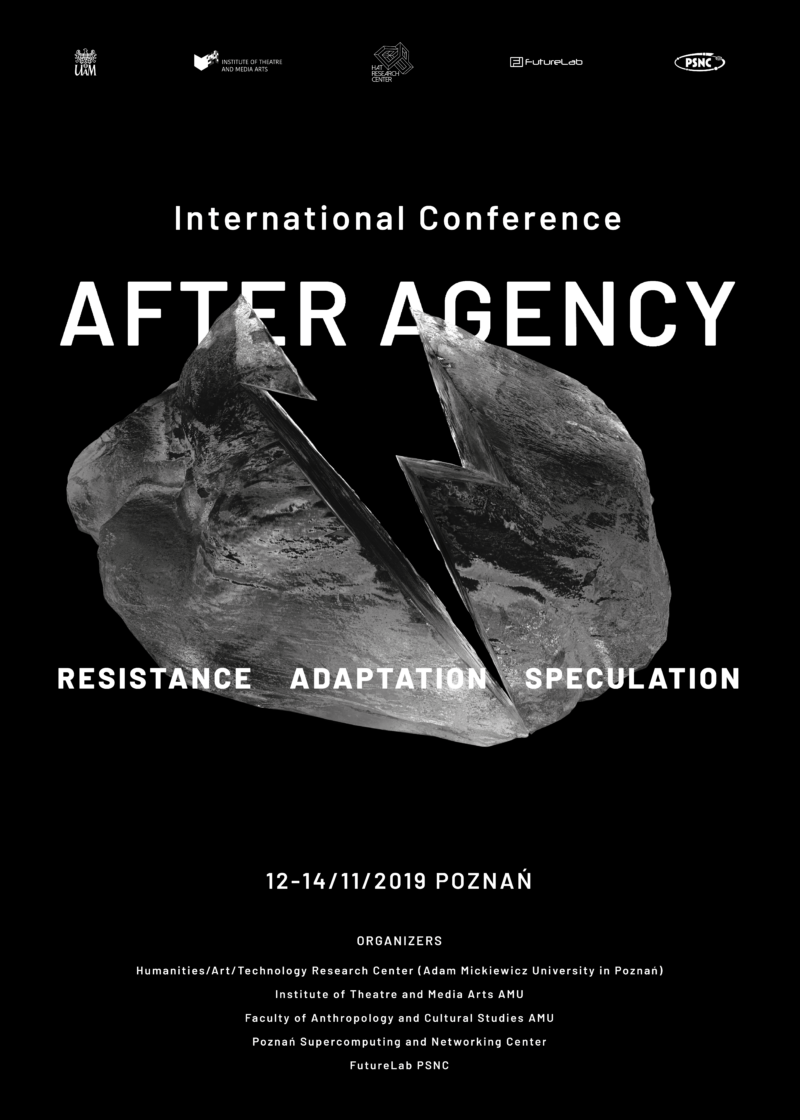AFTER AGENCY – Resistance. Adaptation. Speculation
AFTER AGENCY / International Conference
12-14 November 2019, Poznan, Poland
‘After Agency’ is a provocation. It seems that agency might be in trouble – what we think of it, what we make of it, what and who has it and what emerges in its unfolding or de-folding. Scholars have informed us of the more-than-human agencies of emergent worlds (Haraway, 2008; Tsing, 2015; Kirsky, 2015; Kohn, 2013) and the speculative becomings of/with agencies that alter the possibility of worlds (Morton, 2013; Taussig, 2018; Murphy, 2017; Weizman, 2012; Barad, 2007) in the context of capitalist violence, anthropogenic toxicities and the timely matter of life itself.
‘Agency’ and the collective sensibility of agency inform the practice of research, knowledge production, methodologies and methods of situated thinking with the world at large. The posthuman and ontological turn in the wake of the Anthropocene (Braidotti, 2013; Wark, 2015; Chandler, 2018; Castro, 2009; Escobar, 2018) offers a certain opportunity to push further, conceptual questionings of what is conventionally thought of as agency. Attuned to the situatedness of each of our many political encounters – we notice the spectre of financial violence, white supremacy and capitalist injustice wound up in the figuring of our presumed times “after agency.” Does this not then call for a reimagining of our methods and methodologies?
Stream #1 Resistance
keynote presentation: prof. Julian Reid (University of Lapland), The Image of Resistance
What characterizes academic labor in the contemporary moment is a severance between scholarly research and ‘on the ground’ strategies of resistance. Given the rise of algorithmic governance (the cybernetic hypothesis) and the generational violence of deep-time environmental destruction (the Anthropocene hypothesis), we must move beyond a mere description of the situation we find ourselves in and ask – what tools are available to us? What techniques and practices of resistance can we call upon that are still viable? And how can we recognize when resistance itself becomes a hubristic normative reproduction at best, and at worst – a ‘disruptive’ capitalist ethos?
Stream #2 Speculation
keynote presentation: prof. Rosi Braidotti (Utrecht University), KnowledgeProduction in Posthuman Times
The idea of speculation requires an agential and compositional inquiry. Speculation seems to form and ingrain worlds, in turbulence and beyond. Speculative acts in art, finance, knowledge production and a range of interacting and intra-acting world-making disciplines, imply becomings. Drawing from Rosi Braidotti’s notion of the posthuman and a posthuman humanities, this stream invites a conversation on speculating-with and thinking of speculation in the context of affirming bonds “that locates the subject in the flow of relations with multiple others” (Braidotti 2016, 99). What circulations can a speculative posthuman ethics speak to? What are some of the implications of this thinking on our collective practices? What are some of the challenges of this agenda? How do situated stories and ontologies speak to the project?
Recognizing the need for a more-than-human circulation in the posthuman circulation of stories, this stream is keen for a situated engagement with the HAT Research Center as a situated site of material and discourse – re-forming, re-thinking and speculating with the living, in finding allies in these precarious airs and times. We desire speculation in decolonial terms. We seek speculative assistance in-trouble and we intend on gathering a conversation on our research and practice to ask where could these speculations go?
Stream #3 Adaptation
keynote presentation: prof. Peter Kahn (University of Washington), TechnologicalNature: Adaptation and the Future of Human Life
The concept of adaptation is crucial in considering the increasing technological impact on “nature” and evolutionary changes in human behaviour. For many scientists, such as the psychologist Peter Kahn, adaptation describes an organism’s adjustment to its environment (Kahn, 2011). Thus, adaptation is not in itself normative; it is a mostly multilayered and a multidirectional set of actions. What Kahn stresses in his analysis is that the inalienable element of adaptive processes is harm. He demarcates two types of harm: direct harm, and the harm of unfulfilled flourishing. In this stream, we would like to discuss unintentional harm in the broader problematics of agential adaptation. Indirect forms of harm should push us toward re-contextualizing human and nonhuman agencies inscribed in the Anthropocene (with all the different terminological options, such as the Capitalocene, Plantationocene, Chthulucene etc.). We are also interested in refiguring the common perception of the supposed ‘nonagentiality’ of human and nonhuman forces, asking about harm in post- and de-colonial research and in necropolitics (A. Mbembe 2003, 2016). From the perspective of social changes and new policies, we are going to discuss to what extent harm could be seen as a necessary and controlled condition for resilient and adaptive societies on both the local and global scale?
Organising Committee:
Agnieszka Jelewska, Humanities/Art/Technology Research Center, Adam Mickiewicz University
Michał Krawczak, Humanities/Art/Technology Research Center, Adam Mickiewicz University
Damian Niemir, Poznan Supercomputing and Networking Center
Harshavardhan Bhat, University of Westminster
Brett Zehner, Brown University
Organization:
Humanities/Art/Technology Research Center / Adam Mickiewicz University in Poznan
Poznan Supercomputing and Networking Center
FutureLab / Poznan Supercomputing and Networking Center
Institute of Theatre and Media Arts / Adam Mickiewicz University in Poznan
Faculty of Anthropology and Cultural Studies / Adam Mickiewicz University in Poznan
